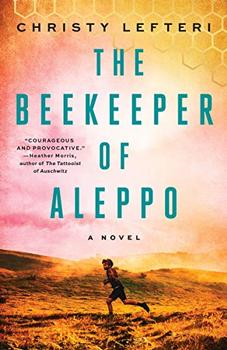Summary | Excerpt | Reading Guide | Discuss | Reviews | Beyond the Book | Readalikes | Genres & Themes | Author Bio

A Novel
by Christy Lefteri
Sami would be there, smiling and running along those alleys with his scuffed sneakers, change in his hand, on his way to the store to get milk. I try not to think about Sami. But Mohammed? I'm still waiting for him to find the letter and money I left under the jar of Nutella. I think one morning there will be a knock at the door, and when I open it he will be standing there and I will say, "But how did you get all the way here, Mohammed? How did you know where to find us?"
Yesterday I saw a boy in the steamed-up mirror of the shared bathroom. He was wearing a black T-shirt, but when I turned around it was the man from Morocco, sitting on the toilet, pissing. "You should lock the door," he said in his own Arabic.
I can't remember his name, but I know that he is from a village near Taza, beneath the Rif mountains. He told me last night that they might send him to the detention center in a place called Yarl's Wood—the social worker thinks there's a chance they will. It's my turn to meet her this afternoon. The Moroccan man says she's very beautiful, that she looks like a dancer from Paris who he once made love to in a hotel in Rabat, long before he married his wife. He asked me about life in Syria. I told him about my beehives in Aleppo.
In the evenings the landlady brings us tea with milk. The Moroccan man is old, maybe eighty or even ninety. He looks and smells like he's made of leather. He reads How to Be a Brit, and sometimes smirks to himself. He has his phone on his lap, and pauses at the end of each page to glance down at it, but no one ever calls. I don't know who he's waiting for and I don't know how he got here and I don't know why he has made such a journey so late in his life, because he seems like a man who is waiting to die. He hates the way the non-Muslim men stand up to piss.
There are about ten of us in this run-down B and B by the sea, all of us from different places, all of us waiting. They might keep us, they might send us away, but there is not much to decide anymore. Which road to take, whom to trust, whether to raise the bat again and kill a man. These things are in the past. They will evaporate soon, like the river.
I take Afra's abaya from the hanger in the wardrobe. She hears it and stands, lifting her arms. She looks older now, but acts younger, like she has turned into a child. Her hair is the color and texture of sand since we dyed it for the photos, bleached out the Arabic. I tie it into a bun and wrap her hijab around her head, securing it with hairpins while she guides my fingers like she always does.
The social worker will be here at 1:00 p.m., and all meetings take place in the kitchen. She will want to know how we got here and she will be looking for a reason to send us away. But I know that if I say the right things, if I convince her that I'm not a killer, then we will get to stay here because we are the lucky ones, because we have come from the worst place in the world. The Moroccan man isn't so lucky; he will have more to prove. He is sitting in the living room now by the glass doors, holding a bronze pocket watch in both of his hands, nestling it in his palms like it's a hatching egg. He stares at it, waiting. What for? When he sees that I'm standing here, he says, "It doesn't work, you know. It stopped in a different time." He holds it up in the light by its chain and swings it, gently, this frozen watch made of
bronze
was the color of the city far below. We lived in a two-bedroom bungalow on a hill. From so high up we could see all the unorganized architecture and the beautiful domes and minarets, and far in the distance the citadel peeking through.
It was pleasant to sit on the veranda in the spring; we could smell the soil from the desert and see the red sun setting over the land. In the summer, though, we would be inside with a fan running and wet towels on our heads, and our feet in a bowl of cold water because the heat was an oven.
Excerpted from The Beekeeper of Aleppo by Christy Lefteri. Copyright © 2019 by Christy Lefteri. All rights reserved. No part of this excerpt may be reproduced or reprinted without permission in writing from the publisher.
The good writer, the great writer, has what I have called the three S's: The power to see, to sense, and to say. ...
Click Here to find out who said this, as well as discovering other famous literary quotes!
Your guide toexceptional books
BookBrowse seeks out and recommends the best in contemporary fiction and nonfiction—books that not only engage and entertain but also deepen our understanding of ourselves and the world around us.